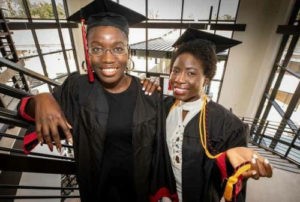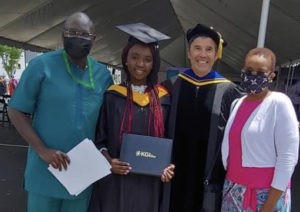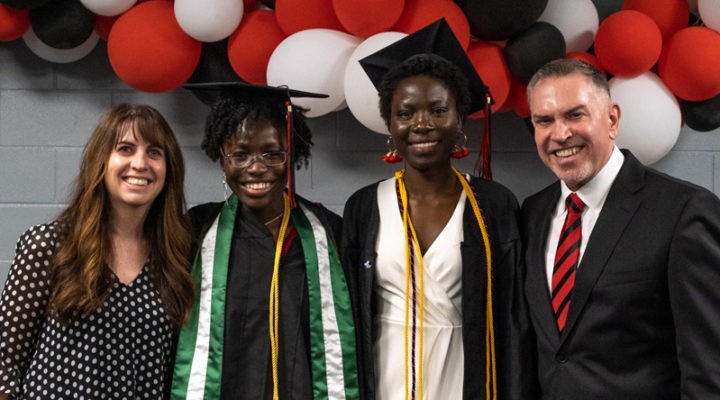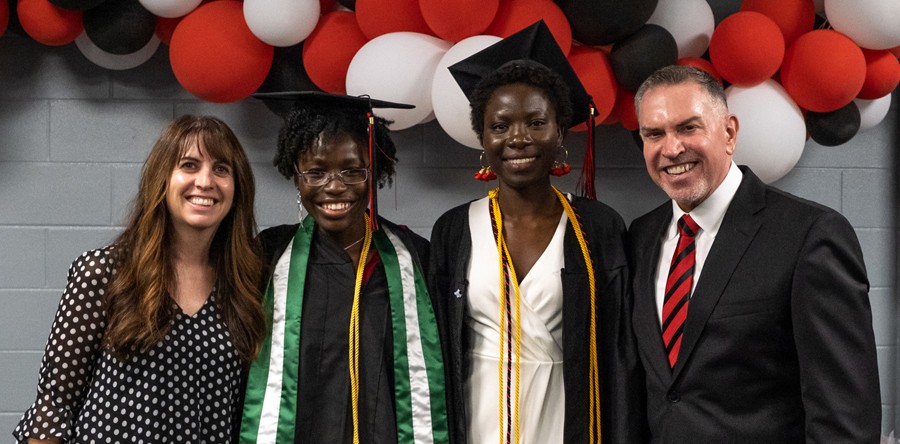Three Nigerian students who once were kidnapped or had a family member killed by Boko Haram terrorists in Nigeria have graduated from American universities this spring. Joy Bishara and Lydia Pogu recently earned degrees from Southeastern University in Florida, while Zion Faye earned a master’s degree from Keck Graduate Institute in California.
These educational achievements represent a new milestone in the life of the Nigerians whose future seemed all but shattered not long ago when Boko Haram terrorists — who have an avowed hatred for Western education and a desire to create a caliphate in Northern Nigeria — stormed the residence and school of the girls and left their trademark sorrow, tears and blood on their trail.
Assassination and kidnapping
First to swallow the bitter pill was Zion, the daughter of Umar Pama Faye, a Borno State-based pastor and secretary of the Christian Association of Nigeria who was assassinated by terrorists in May 2013. The pastor was killed despite the pleading of his daughter, Zion, that they spare his life. They shot him and injured Zion in the process, leaving her with a bullet lodged in her head. That put her own life in danger, but the young girl came out of the hospital stronger.

Joy Bishara and Lydia Pogu
A year after that tragedy, Joy and Lydia had a taste of Boko Haram’s viciousness when their boarding school in Chibok, Borno State, was invaded at night by the fearsome militants who rounded up the girls with more than 270 others and drove off in a truck. As the vehicle roared off and began its journey to who knows where, Lydia and Joy summoned courage and jumped out of the truck. They were not the only ones, as more than 50 of the girls reportedly either escaped that night or in the days after.
Educational pursuits
After those tragic incidents, Joy and Lydia later found their way to the United States with the help of the Jubilee Campaign, a Virginia-based human rights group. They went on to complete high school at Canyonville Christian Academy in Oregon and have now, against all odds, graduated from Southeastern University, a private Christian school.
Dana Davis, chief communications officer at Southeastern University, confirmed that Lydia and Joy earned their degrees from the institution. “I can confirm that both Joy and Lydia were students at Southeastern University. They graduated in April. Joy earned her bachelor’s degree in social work, and Lydia earned her bachelor’s degree in legal studies,” she said. The university also published a photo of the women on its website.

Zion Faye shown with Emmanuel Ogebe (left), a university official and Mrs. Ogebe.
In a recent graduation photo and videos, Zion was seen with officials of KGI, some students as well as Emmanuel Ogebe, a U.S.-based human and religious rights activist, who helped her and some former captives of Boko Haram relocate to the U.S. Having been deprived of her loving dad and breadwinner, whom sources described as a committed and kind Christian who helped many who came his way, Ogebe stepped in and assumed the role of a guardian and benefactor to Zion.
In a recent Facebook video posted by Ogebe, Zion is seen at a church service where she thanked God and members of the church for their support and prayers: “I just want to thank God for his protection … for my life, more especially for being able to graduate from my master’s program, the hardest two years of my life. I remember when I was doing my undergrad for (my) chemistry degree, I said, ‘Oh my God, those were the hardest two years and four years of my life,’ and now looking back, those were the easiest.”

Zion Faye (right) posing with classmates at KGI on graduation day.
In a news release, Ogebe said Zion achieved the educational feat “the day after the eighth anniversary of the May 14, 2013, terror attack in which she and her dad were shot by Boko Haram in their home,” and that “my family and I were privileged to see this schoolgirl go from high school to community college, university and graduate school in five years.”
Prior controversy about exploitation
Prior to now, controversy had trailed some of the Chibok schoolgirls in the U.S. By September 2016, about 15 of the girls were reported to be in the U.S. for education-related purposes but that report was challenged by Aishatu Alhassan, then minister of women affairs in Nigeria.
Speaking in Maiduguri, where she met with some parents of the Chibok girls, Alhassan said the Nigerian government found out some of the girls were being exploited by their supposed benefactors and that some of them were complaining about it.
Alhassan, who died in May, explained at the time that some of the girls were “being used as tools for making money — not prostitution — but in the sense that they will be taken here and there where they go and relay their experiences during the insurgency, especially the invasion of Chibok town by Boko Haram and how they were abducted,” and, “after that, people used them to ask for donations; by so doing they make money out of it.”
Given the Nigerian government’s concerns about the situation, five of the students were transferred from Ogebe to an NGO, Murtala Muhammed Foundation, to help them achieve their educational goals.
Ogebe wasn’t happy about the development. Seeking redress, he instituted a $5 million libel lawsuit against the Nigerian government, saying it had maligned his name. He also claimed, in a news release, that the Nigerian government collected millions of dollars from foreign countries: Japan, UK, U.S. and others, in regard to the Chibok girls abduction but failed to sponsor any of the victims to school and that one of the girls handed over to Murtala Mohammed Foundation “converted to Islam in January 2017 — exactly what Boko Haram wanted all along.”
Political fallout in Nigeria
The Chibok schoolgirls kidnapping sparked global outrage and the #BringBackOurGirls hashtag campaign by some Nigerian and global activists.
Goodluck Jonathan, Nigerian president at the time of the kidnapping on April 15, 2014, in his book, My Transition Hours, said the issue of security in secondary schools in Nigeria was the responsibility of state governments and the failure to provide such security at Chibok should be blamed on the Borno State government headed by Kashim Shettima.
However, some analysts believe the Chibok school incident contributed to the fall of the Jonathan administration as it failed to win re-election in 2015, the first time in Nigeria’s history that an incumbent administration was trounced by an opposition party.
Muhammadu Buhari, Jonathan’s successor, promised to secure the release of the remaining kidnapped girls, and his administration is believed to have negotiated with Boko Haram for that purpose. But six years after assuming power, the promise has yet to be fully fulfilled. So far, only 103 of the girls are reported to have been released by the terrorist group as part of a swap deal that required the Nigerian government to release some Boko Haram fighters.
The fate of the more than 100 girls still being held by the terrorists remain unknown.
Related articles:
Boko Haram is still plaguing Nigeria claiming to do God’s work
Three years later, Leah Sharibu is still held captive, reportedly for refusing to renounce her faith
In Africa, some religious leaders pay a heavy price for their faith


